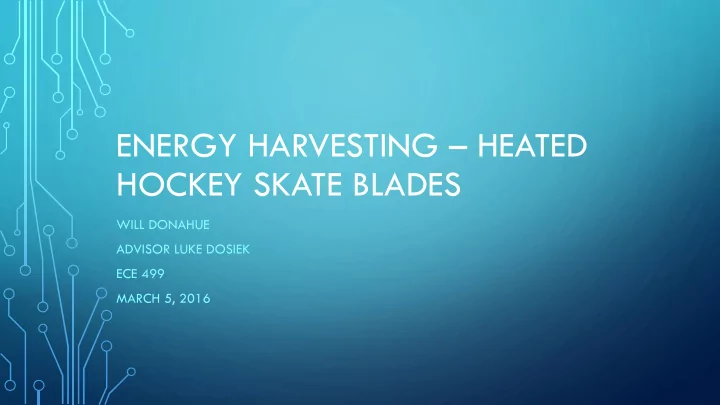

ENERGY HARVESTING – HEATED HOCKEY SKATE BLADES WILL DONAHUE ADVISOR LUKE DOSIEK ECE 499 MARCH 5, 2016
ICE HOCKEY
THE HOCKEY SKATE The Boot The Blade The Tuuk
THERMABLADE
FARADAY’S LAW OF INDUCTION
GOALS • Statistically compete with Thermablade’s product • Implement the system, while keeping devices physical presence unknown • Keep cost of product under $150 • Extremely high reliability
DESIGN AND IMPLEMENTATION Motion of Heated Improved Skate Skating Skate Blade Performance
DESIGN AND IMPLEMENTATIONS - SUBSYSTEMS Skate Linear Power Heating Generator Retention Element
DESIGN AND IMPLEMENTATIONS - SUBSYSTEMS Linear Generator Magnetic Plastic Magnets End Caps Wire Tubing
RESULTS – PROPERTIES OF STEEL BLADE • Tested multiple ways • Straight to Ohm Meter • Voltage division with high resistance • Voltage division with low resistance • Unable to determine resistivity of blade
RESULTS – LINEAR GENERATORS
RESULTS – LINEAR GENERATOR
RESULTS – LINEAR GENERATORS
RESULTS – SELF MADE LINEAR GENERATOR Average Vrms vs. Time Average Vrms/Trial Trial 1 Trial 2 Trial 3 0.4000 Vrms 0.3500 20 rpm 0.1118 0.102 0.1042 0.1060 y = 0.0929e 0.1645x R² = 0.9885 0.3000 30 rpm 0.1384 0.1349 0.1372 0.1368 0.2500 40 rpm 0.1515 0.1522 0.1549 0.1529 0.2000 50 rpm 0.1826 0.1861 0.1793 0.1827 0.1500 60 rpm 0.2183 0.2033 0.1966 0.2061 0.1000 69 rpm 0.2241 0.2446 0.2364 0.2350 0.0500 80 rpm 0.2863 0.2771 0.2959 0.2864 100 rpm 0.3464 0.3624 0.3955 0.3681 0.0000 20 rpm 30 rpm 40 rpm 50 rpm 60 rpm 69 rpm 80 rpm 100 rpm
RESULTS – FLASHLIGHT LINEAR GENERATOR Vrms/Tria Average Average Vrms v. RPM Trial 1 Trial 2 Trial 3 l Vrms 6.0000 20 rpm 0.8155 0.6732 0.6836 0.7241 5.0000 y = 0.515e 0.2765x R² = 0.9953 30 rpm 0.9151 1.0654 0.6067 0.8624 4.0000 AVERAGE VRMS 40 rpm 0.895 1.2006 1.1926 1.0961 3.0000 50 rpm 1.5763 1.5535 1.6119 1.5806 60 rpm 2.246 1.8539 2.1105 2.0701 2.0000 69 rpm 2.9505 2.8809 2.6827 2.8380 1.0000 80 rpm 3.3357 3.5339 3.44 3.4365 0.0000 100 rpm 4.3466 5.0607 4.8851 4.7641 20 rpm 30 rpm 40 rpm 50 rpm 60 rpm 69 rpm 80 rpm 100 rpm
RESULTS – LINEAR GENERATOR SIMULATION
RESULTS – LINEAR GENERATOR SIMULATION
RESULTS – HEAT TRANSFER EQUATION Specific Heat of Steel= .452 kJ/(kg*K) Temperature Change= ∆ T=10K=10°C Mass=.284 kg Q= mC∆T The above equation is used to calculate the amount of power need to change temperature in a specific material. =.284kg*.452kJkg*K*10K=1.288 kJ The equation uses the specific heat of steel, the temperature change of the blade from 23F to 41F and the weight of the average steel blade. Assume time(t)= 180s P=1.28kJ/180s*1000=7.13 W
RESULTS – TEMPERATURE CHANGE IN WIRE Resistor 26 Gauge Resistive Wire Arduino Uno Thermistor
RESULTS – TEMPERATURE CHANGE IN WIRE TEMPERATURE (C) 10 15 20 25 30 35 40 0 5 0.5 1 1.5 2 2.5 3 3.5 4 4.5 5 5.5 6 6.5 7 7.5 Temperature vs Time 8 8.5 9 9.5 10 10.5 TIME (S) 11 11.5 12 12.5 13 13.5 14 14.5 15 15.5 16 16.5 17 17.5 18 18.5 19 19.5 20 20.5 21 21.5 22
CONCLUSIONS AND FURTHER WORK • Road Blocks • A lot of mechanical engineering involved in heat transfer • Resistive strip vs Resistive wire • Heat Transfer • Will be working on before term is done to show system will work • Component Research • Control System to Limit Heat
QUESTIONS?
Recommend
More recommend